
-
 France set to face New Zealand with second-string squad
France set to face New Zealand with second-string squad
-
Eyeing China, EU moves to ban 'high-risk' foreign suppliers from telecoms networks

-
 Struggling Suryakumar will not adapt style to find form before T20 World Cup
Struggling Suryakumar will not adapt style to find form before T20 World Cup
-
World stocks sink, gold hits high on escalating trade war fears
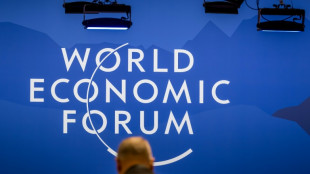
-
 Easier said than done for US to apply tariffs on single EU states
Easier said than done for US to apply tariffs on single EU states
-
Canada military models response to US invasion: report
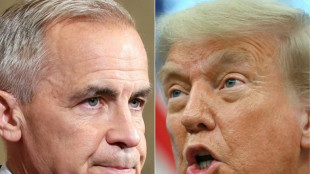
-
 Salah returns to Liverpool training after AFCON
Salah returns to Liverpool training after AFCON
-
Milan menswear shows add bling with brooches

-
 Scotland recall Gray, Cherry for Six Nations
Scotland recall Gray, Cherry for Six Nations
-
Scheib storms to Kronplatz giant slalom victory as Brignone impresses in World Cup return

-
 Chagos Islands: international dispute and human drama
Chagos Islands: international dispute and human drama
-
Thousands of farmers protest EU, Mercosur trade deal ahead of vote

-
 Men's Fashion Week kicks off in Paris with tributes for Valentino
Men's Fashion Week kicks off in Paris with tributes for Valentino
-
Lake named as captain as Wales unveil Six Nations squad

-
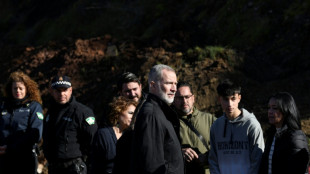 Royals visit deadly train crash site as Spain mourns
Royals visit deadly train crash site as Spain mourns
-
Police, pro-Kurd protesters clash at Turkey border with Syria

-
 Thai forces razed Cambodian homes on border: rights group
Thai forces razed Cambodian homes on border: rights group
-
Jellyfish-inspired Osaka battles into Australian Open round two

-
 Valentino taught us to respect women, says partner
Valentino taught us to respect women, says partner
-
Australia stiffens hate crime, gun laws after Bondi attack

-
 Mercedes chief designer Owen to leave F1 team
Mercedes chief designer Owen to leave F1 team
-
Trump unloads on allies as Davos showdown looms

-
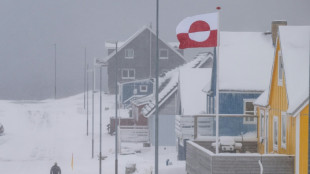 Moscow revels in Trump's Greenland plans but keeps concerns quiet
Moscow revels in Trump's Greenland plans but keeps concerns quiet
-
Global tourism hit new record level in 2025: UN

-
 Senegal poised to party with parade honouring AFCON champs
Senegal poised to party with parade honouring AFCON champs
-
Osaka emerges for Melbourne opener under hat, veil and parasol

-
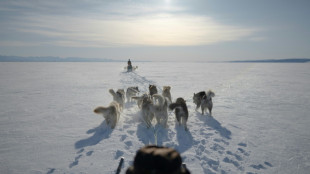 Dogsled diplomacy in Greenland proves elusive for US
Dogsled diplomacy in Greenland proves elusive for US
-
Almost half of Kyiv without heat, power, after Russian attack

-
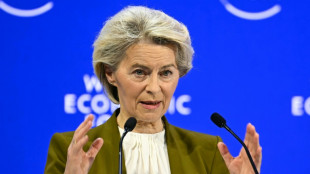 EU vows 'unflinching' response to Trump's Greenland gambit
EU vows 'unflinching' response to Trump's Greenland gambit
-
Osaka steals show at Australian Open as Sinner strolls through

-
 Brignone impresses in first run of Kronplatz giant slalom in World Cup comeback
Brignone impresses in first run of Kronplatz giant slalom in World Cup comeback
-
Osaka emerges for Melbourne opener under white hat and umbrella

-
 Malawi suffers as US aid cuts cripple healthcare
Malawi suffers as US aid cuts cripple healthcare
-
Bessent says Europe dumping US debt over Greenland would 'defy logic'

-
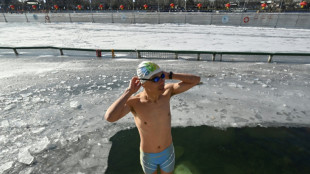 Freeze, please! China's winter swimmers take the plunge
Freeze, please! China's winter swimmers take the plunge
-
Talks between Damascus, Kurdish-led forces 'collapse': Kurdish official to AFP
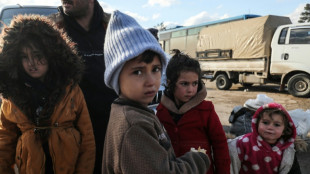
-
 In-form Bencic makes light work of Boulter at Australian Open
In-form Bencic makes light work of Boulter at Australian Open
-
Spain mourns as train disaster toll rises to 41

-
 Sinner into Melbourne round two as opponent retires hurt
Sinner into Melbourne round two as opponent retires hurt
-
Israel begins demolitions at UNRWA headquarters in east Jerusalem

-
 Almost half of Kyiv without heat, power, after Russian attack: govt
Almost half of Kyiv without heat, power, after Russian attack: govt
-
Veteran Monfils exits to standing ovation on Australian Open farewell

-
 Precision-serving former finalist Rybakina powers on in Melbourne
Precision-serving former finalist Rybakina powers on in Melbourne
-
South Korea's women footballers threaten boycott over conditions

-
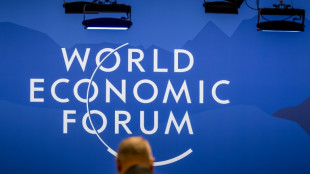 Equities sink, gold and silver hit records as Greenland fears mount
Equities sink, gold and silver hit records as Greenland fears mount
-
Australian lawmakers back stricter gun, hate crime laws

-
 EU wants to keep Chinese suppliers out of critical infrastructure
EU wants to keep Chinese suppliers out of critical infrastructure
-
AI reshaping the battle over the narrative of Maduro's US capture

-
 Penguins bring forward breeding season as Antarctica warms: study
Penguins bring forward breeding season as Antarctica warms: study
-
Vietnam leader pledges graft fight as he eyes China-style powers

| RIO | -0.14% | 85.01 | $ | |
| CMSC | -0.17% | 23.44 | $ | |
| SCS | 0.12% | 16.14 | $ | |
| BTI | -2.5% | 56.8 | $ | |
| NGG | -0.63% | 80.38 | $ | |
| GSK | -0.34% | 48.055 | $ | |
| RBGPF | -1.87% | 82.5 | $ | |
| BCC | -2.13% | 83.724 | $ | |
| BCE | -0.19% | 24.095 | $ | |
| RYCEF | 0.06% | 17.06 | $ | |
| RELX | -2.51% | 40.61 | $ | |
| CMSD | -0.78% | 23.736 | $ | |
| BP | 0.18% | 35.445 | $ | |
| JRI | -0.22% | 13.67 | $ | |
| AZN | -4.41% | 90.439 | $ | |
| VOD | 0.26% | 13.505 | $ |

Hotter, drier, sicker? How a changing planet drives disease
Humans have made our planet warmer, more polluted and ever less hospitable to many species, and these changes are driving the spread of infectious disease.
Warmer, wetter climates can expand the range of vector species like mosquitos, while habitat loss can push disease-carrying animals into closer contact with humans.
New research reveals how complex the effects are, with our impact on the climate and planet turbocharging some diseases and changing transmission patterns for others.
Biodiversity loss appears to play an outsize role in increasing infectious disease, according to work published in the journal Nature this week.
It analysed nearly 3,000 datasets from existing studies to see how biodiversity loss, climate change, chemical pollution, habitat loss or change, and species introduction affect infectious disease in humans, animals and plants.
It found biodiversity loss was by far the biggest driver, followed by climate change and the introduction of novel species.
Parasites target species that are more abundant and offer more potential hosts, explained senior author Jason Rohr, a professor of biological sciences at the University of Notre Dame.
And species with large populations are more likely to "be investing in growth, reproduction and dispersal, at the expense of defences against parasites", he told AFP.
But rarer species with more resistance are vulnerable to biodiversity loss, leaving us with "more abundant, parasite-competent hosts".
The warmer weather produced by climate change offers new habitats for disease vectors, as well as longer reproductive seasons.
"If there are more generations of parasites or vectors, then there can be more disease," Rohr said.
- Shifting transmission -
Not all human adaptation of the planet increases infectious disease, however.
Habitat loss or change was associated with a drop in infectious disease, largely because of the sanitary improvements that come with urbanisation, like running water and sewage systems.
Climate change's effects on disease are also not uniform across the globe.
In tropical climates, warmer, wetter weather is driving an explosion in dengue fever.
But drier conditions in Africa may shrink the areas where malaria is transmitted in coming decades.
Research published in the journal Science this week modelled the interaction between climate change, rainfall and hydrological processes like evaporation and how quickly water sinks into the ground.
It predicts a larger decline in areas suitable for disease transmission than forecasts based on rainfall alone, with the decline starting from 2025.
It also finds the malaria season in parts of Africa could be four months shorter than previously estimated.
The findings are not necessarily all good news, cautioned lead author Mark Smith, an associate professor of water research at the University of Leeds.
"The location of areas suitable for malaria will shift," he told AFP, with Ethiopia's highlands among the regions likely to be newly affected.
People in those regions may be more vulnerable because they have not been exposed.
And populations are forecast to grow rapidly in areas where malaria will remain or become transmissible, so the overall incidence of the disease could increase.
- Predicting and preparing -
Smith warned that conditions too harsh for malaria may also be too harsh for us.
"The change in water availability for drinking or agriculture could be very serious indeed."
The links between climate and infectious disease mean climate modelling can help predict outbreaks.
Local temperature and rainfall forecasts are already used to predict dengue upticks, but they offer a short lead-time and can be unreliable.
One alternative might be the Indian Ocean basin-wide index (IOBW), which measures the regional average of sea-surface temperature anomalies in the Indian Ocean.
Research also published in Science this week looked at dengue data from 46 countries over three decades and found a close correlation between the IOBW's fluctuations and outbreaks in the northern and southern hemispheres.
The study was retrospective, so the IOBW's predictive power has not yet been tested.
But monitoring it could help officials better prepare for outbreaks of a disease that is a major public health concern.
Ultimately, however, addressing increasing infectious disease means addressing climate change, said Rohr.
Research suggests "that disease increases in response to climate change will be consistent and widespread, further stressing the need for reductions in greenhouse gas emissions", he said.
B.Baumann--VB



